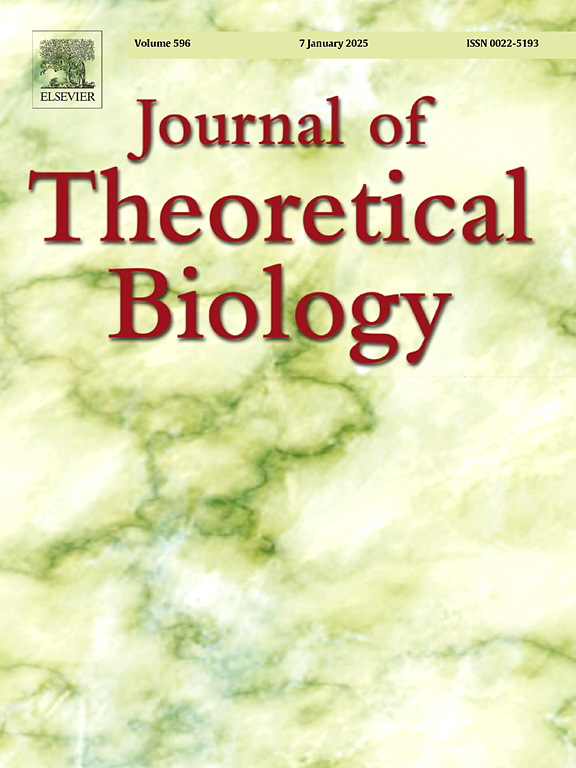Stability and reactivity of food webs with trophic interactions
IF 2
4区 数学
Q2 BIOLOGY
引用次数: 0
Abstract
Ecosystems are increasingly vulnerable to species extinctions and functional disruptions driven by climate change and anthropogenic pressures. Although significant progress has been made in understanding the stability and reactivity of ecosystems, the influence of functionally distinct species groups remains underexplored. Here, we develop a food web model that incorporates producers, consumers, decomposers, and detritus, effectively capturing key characteristics of real food webs. By simulating ecologically realistic perturbations-including species loss, interaction loss, and changes in interaction strength-we examine how trophic structure shapes the stability and reactivity of food webs. We demonstrate that stability and reactivity are not determined solely by species richness or network connectivity, but are critically influenced by the functional roles of species. Shifts in interaction strength can trigger phase transitions in food webs. Our results reveal that, compared to other taxa, variations in the interaction strength of consumer taxa pose a greater threat to the overall state of food webs, increasing the likelihood of reactive or unstable dynamics. Finally, we propose that enhancing self-regulation and managing species abundances can promote ecosystem resilience and mitigate large-scale species loss under persistent disturbances. This work offers a functional perspective on ecosystem stability and reactivity, and provides new insights for the conservation and restoration of food webs.
营养相互作用下食物网的稳定性和反应性。
由于气候变化和人为压力,生态系统越来越容易受到物种灭绝和功能破坏的影响。虽然在了解生态系统的稳定性和反应性方面取得了重大进展,但功能独特的物种群的影响仍未得到充分探索。在这里,我们开发了一个包含生产者、消费者、分解者和碎屑的食物网模型,有效地捕捉了真实食物网的关键特征。通过模拟生态现实的扰动——包括物种损失、相互作用损失和相互作用强度的变化——我们研究了营养结构如何塑造食物网的稳定性和反应性。我们证明了稳定性和反应性不仅仅由物种丰富度或网络连通性决定,而是受到物种功能角色的严重影响。相互作用强度的变化可以引发食物网的相变。结果表明,与其他类群相比,消费类群相互作用强度的变化对食物网的整体状态构成了更大的威胁,增加了反应性或不稳定动态的可能性。最后,我们提出加强自我调节和物种丰度管理可以提高生态系统的恢复力,减轻持续干扰下的大规模物种损失。这项工作为生态系统稳定性和反应性提供了功能视角,并为食物网的保护和恢复提供了新的见解。
本文章由计算机程序翻译,如有差异,请以英文原文为准。
求助全文
约1分钟内获得全文
求助全文
来源期刊
CiteScore
4.20
自引率
5.00%
发文量
218
审稿时长
51 days
期刊介绍:
The Journal of Theoretical Biology is the leading forum for theoretical perspectives that give insight into biological processes. It covers a very wide range of topics and is of interest to biologists in many areas of research, including:
• Brain and Neuroscience
• Cancer Growth and Treatment
• Cell Biology
• Developmental Biology
• Ecology
• Evolution
• Immunology,
• Infectious and non-infectious Diseases,
• Mathematical, Computational, Biophysical and Statistical Modeling
• Microbiology, Molecular Biology, and Biochemistry
• Networks and Complex Systems
• Physiology
• Pharmacodynamics
• Animal Behavior and Game Theory
Acceptable papers are those that bear significant importance on the biology per se being presented, and not on the mathematical analysis. Papers that include some data or experimental material bearing on theory will be considered, including those that contain comparative study, statistical data analysis, mathematical proof, computer simulations, experiments, field observations, or even philosophical arguments, which are all methods to support or reject theoretical ideas. However, there should be a concerted effort to make papers intelligible to biologists in the chosen field.

 求助内容:
求助内容: 应助结果提醒方式:
应助结果提醒方式:


